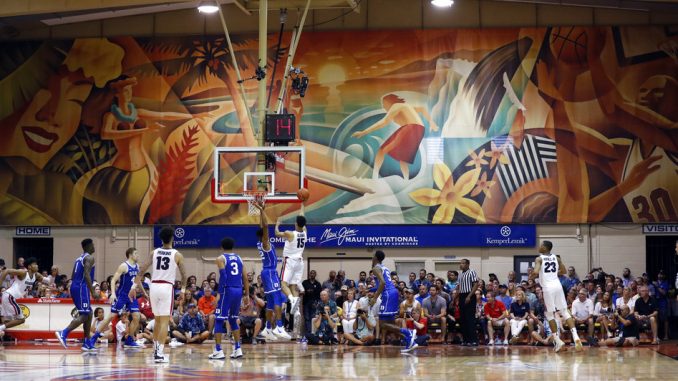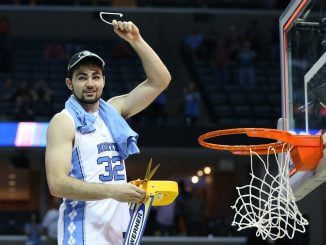
North Carolina will host one of college basketball’s premier in-season tournaments this November when the Maui Invitational is held in Asheville.
The annual tournament normally allows some of basketball’s best teams to make a Thanksgiving week visit to Hawaii’s beaches. The COVID-19 pandemic has moved the event to the mainland, however. It’s also being shifted a week later and will be held Nov. 30 to Dec. 2.
The event will still be called the Maui Invitational and be one of the most geographically inappropriately named events to be held in the state, joining the 1942 Rose Bowl. That football game, associated for more than a century with Pasadena, California, was moved to Wallace Wade Stadium at Duke due to concerns over potential Japanese attacks during World War II.
The Maui Invitational’s eight-team field will feature two teams now playing in their home state — Davidson and North Carolina. They’re joined by Texas, Indiana, Alabama, Providence, Stanford and UNLV. UNC has won the event four times, most recently in 2016, one short of the Maui record held by Duke. Only two other teams in this year’s field have won the event: Providence won the initial Maui Invitational in 1984, and Indiana won in 2002.
Roy Williams, in particular, has been a big fan of the tournament. His three Tar Heel teams to win national titles all won the Maui Invitational earlier in the season.
“As many people know, Maui is one of my favorite places in the world and I’ve always loved playing in that tournament,” he said. “I love the people that run it, but because of COVID, I know we can’t go to Maui this time. I was pleasantly surprised a few weeks ago when I heard Asheville might be one of the locations that was being considered as an alternate site.
“From what I understand, the people in Asheville did a great job explaining to the tournament staff that they run the Southern Conference Tournament there, they have the hotel space, they have everything we would need, and at the end of the day, it looks like Asheville won out through that process. Again, Maui is one of my favorite places to go, but my hometown is as well, and I congratulate the people in Asheville because they did a great job convincing the tournament organizers that they will do a great job. Now I have to concern myself with making sure our basketball team plays well.”
The event annually is one of Hawaii’s biggest revenue generators. The 2018 tournament, in which Duke lost in the championship game to Gonzaga, brought an estimated $21.99 million in revenue to the region. Tournament organizers say that the Invitational has contributed more than $250 million in its 36-year history, including $80 million over the last five years.
The Asheville event will have attendance drastically reduced due to social distancing — if fans are allowed in at all — which will reduce the revenue it generates for North Carolina. Still, early estimates are that it should bring at least $1.1 million to the local economy.
Obviously, North Carolina is one of college basketball’s hotbeds for postseason tournaments. The state has held 53 of the 67 ACC Tournaments in history and hosted NCAA Tournament games 59 times, including the 1974 and 1994 Final Fours.
As Williams said, Asheville has hosted the Southern Conference Tournament each of the last nine years and a total of 21 times, the most by any city in the 99-year history of the event.
However, the state also has a long history of hosting midseason tournaments. Legendary NC State coach Everett Case started the Dixie Classic, a post-Christmas eight-team tournament that ran from 1949 to 1960. The Tar Heels won the Classic on their way to the 1957 NCAA title.
A generation later, the four North Carolina ACC schools participated in the Big Four Tournament from 1971 to 1981. The 1974 Wolfpack won the Big Four on their way to a title.
Charlotte hosted an eight-team tournament from the late 1980s into the 1990s. The Tournament of Champions was sponsored by Diet Pepsi, Harris Teeter and Food Lion at times. The 1993 Tar Heels won the event on their way to a title.
Now, the Maui Invitational is added to the list, and instead of pregame beach time and postgame luaus this fall, the Tar Heels, Davidson Wildcats and six other teams will be enjoying the North Carolina mountains.



